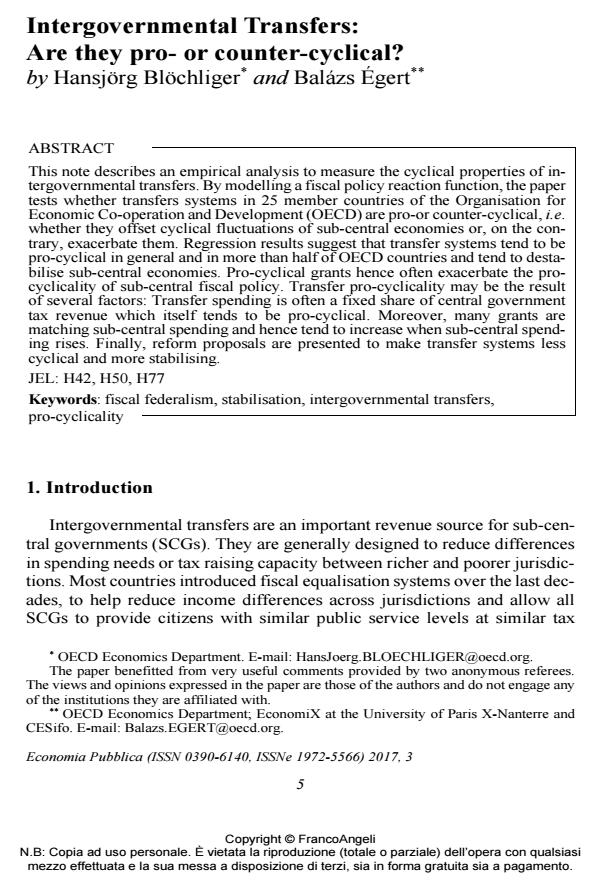Intergovernmental Transfers: Are they pro- or counter-cyclical?
Journal title ECONOMIA PUBBLICA
Author/s Hansjörg Blöchliger, Balázs Égert
Publishing Year 2018 Issue 2017/3
Language English Pages 16 P. 5-20 File size 238 KB
DOI 10.3280/EP2017-003001
DOI is like a bar code for intellectual property: to have more infomation
click here
Below, you can see the article first page
If you want to buy this article in PDF format, you can do it, following the instructions to buy download credits

FrancoAngeli is member of Publishers International Linking Association, Inc (PILA), a not-for-profit association which run the CrossRef service enabling links to and from online scholarly content.
This note describes an empirical analysis to measure the cyclical properties of intergovernmental transfers. By modelling a fiscal policy reaction function, the paper tests whether transfers systems in 25 member countries of the Organisation for Economic Co-operation and Development (OECD) are pro-or counter-cyclical, i.e. whether they offset cyclical fluctuations of sub-central economies or, on the contrary, exacerbate them. Regression results suggest that transfer systems tend to be pro-cyclical in general and in more than half of OECD countries and tend to destabilise sub-central economies. Pro-cyclical grants hence often exacerbate the pro-cyclicality of sub-central fiscal policy. Transfer pro-cyclicality may be the result of several factors: Transfer spending is often a fixed share of central government tax revenue which itself tends to be pro-cyclical. Moreover, many grants are matching sub-central spending and hence tend to increase when sub-central spending rises. Finally, reform proposals are presented to make transfer systems less cyclical and more stabilising.
Keywords: Fiscal federalism, stabilisation, intergovernmental transfers, pro-cyclicality
Jel codes: H42, H50, H77
- Redistribution and risk-sharing effects of intergovernmental transfers: an empirical analysis based on Italian municipal data Giampaolo Arachi, Francesco Porcelli, Alberto Zanardi, in Regional Studies /2023 pp.1523
DOI: 10.1080/00343404.2022.2149726
Hansjörg Blöchliger, Balázs Égert, Intergovernmental Transfers: Are they pro- or counter-cyclical? in "ECONOMIA PUBBLICA " 3/2017, pp 5-20, DOI: 10.3280/EP2017-003001